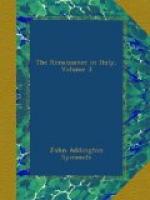I speak of Dante, whose high
work remains
Unknown, unhonoured
by that thankless brood,
Who only to just
men deny their wage.
Were I but he! Born for
like lingering pains,
Against his exile
coupled with his good
I’d gladly
change the world’s best heritage!
QUANTE DIRNI SI DE’
No tongue can tell of him
what should be told,
For on blind eyes
his splendour shines too strong;
’Twere easier
to blame those who wrought him wrong,
Than sound his least praise
with a mouth of gold.
He to explore the place of
pain was bold,
Then soared to
God, to teach our souls by song;
The gates heaven
oped to bear his feet along,
Against his just desire his
country rolled.
Thankless I call her, and
to her own pain
The nurse of fell
mischance; for sign take this,
That ever to the
best she deals more scorn:
Among a thousand proofs let
one remain;
Though ne’er
was fortune more unjust than his,
His equal or his
better ne’er was born.
About the date of the two next sonnets there is less doubt. The first was clearly written when Michael Angelo was smarting under a sense of the ill-treatment he received from Julius. The second, composed at Rome, is interesting as the only proof we possess of the impression made upon his mind by the anomalies of the Papal rule. Here, in the capital of Christendom, he writes, holy things are sold for money to be used in warfare, and the pontiff, quel nel manto, paralyses the powers of the sculptor by refusing him employment.[419]
SIGNOR, SE VERO E
My Lord! if ever ancient saw
spake sooth,
Hear this which
saith: Who can, doth never will.
Lo! thou hast
lent thine ear to fables still,
Rewarding those who hate the
name of truth.
I am thy drudge and have been
from my youth—
Thine, like the
rays which the sun’s circle fill;
Yet of my dear
time’s waste thou think’st no ills
The more I toil, the less
I move thy ruth.
Once ’twas my hope to
raise me by thy height;
But ’tis
the balance and the powerful sword
Of Justice, not
false Echo, that we need.
Heaven, as it seems, plants
virtue in despite
Here on the earth,
if this be our reward—
To seek for fruit
on trees too dry to breed.
QUA SI FA ELMI
Here helms and swords are
made of chalices:
The blood of Christ
is sold so much the quart:
His cross and
thorns are spears and shields; and short
Must be the time ere even
his patience cease.
Nay let Him come no more to
raise the fees
Of fraud and sacrilege
beyond report!
For Rome still
slays and sells Him at the court,
Where paths are closed to
virtue’s fair increase.




